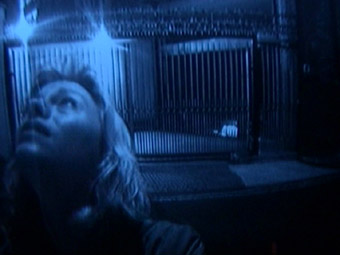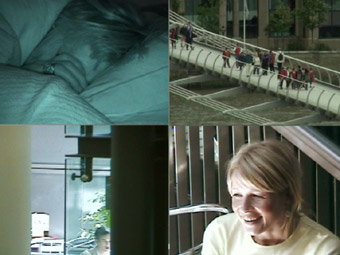|
I
would imagine that a few of the people (and
only a few, as you'll be lucky to find it on the shelves
of your local video rental store) who have picked up Chris
Petit's Unrequited Love on the basis of
its title alone, perhaps expecting a Richard Curtis penned
romantic comedy, have received something of a start when
they played the DVD. Maybe there were a few who took
a cursory look at the back cover and observed that it was
about stalking and were similarly misled into expecting
a thriller in the mode of Fatal Attraction and its scruffy ilk. Even those familiar with the book on
which the film is based (and I confess that I am not one
of them) will probably be ill prepared for what the
film delivers.
Time
Out film critic turned filmmaker and writer Chris Petit's
cinema career spans over twenty-five years, and began auspiciously
back in 1980 with Radio On, which was co-produced
by Wim Wenders (along with Keith Griffiths, also the regular
producer on the Quay
Brothers films). It was followed by a compelling adaptation
of P.D. James' An Unsuitable Job for a Woman, after which I moved away from
London and lost touch with Petit's films, which should give you some idea of the sort of
cinemas in which they played. They were never your standard
multiplex fare (although Unsuitable Job
should have reached a far bigger audience than it did),
but in the years that followed, Petit appears to have all
but rejected the concept of narrative cinema, and with it
film as a recording and delivery medium.
Unrequited Love, which describes itself as 'a
love story in long shot', is closer to an art installation
piece than to traditional dramatic cinema, despite teasing
early indications to the contrary. The opening sequence
in particular, an almost amateurishly wobbly image that
zooms out to place us in the position of unseen voyeur watching
a woman through her living room window at night, soon
prompts the question of just who is stalking whom. Things
do slowly become clearer, but are further complicated
when the roles are later reversed, although even working out that
this has happened is one of the many challenges the film
offers for those who are game.

This
narrative thread runs throughout the film but remains just
that, a thread in a larger patchwork of ideas, images, opinions
and theories, with even a little science and history thrown
in. A cinematic collage of information and experiences relating
to the issue of stalking, it presents nothing on a plate
but is frequently suggestive of what it means to be stalked
in a high tech, surveillance-heavy age, where video cameras,
email and text messaging have increased both the possibilities
for communication and the potential for privacy invasion.
Information
is presented in broken mirror fashion, shattered fragments
of a narrative into which documentary
and personal asides have been scattered. The action is seen largely from the
viewpoint of others, whether it be point-of-view, video
camera or mobile phone footage (the low-band recording format
makes it hard to tell which of these you are watching for
much of the time), the use of CCTV cameras a reminder that
we are all effectively being stalked to some degree on a
daily basis by people we will probably never meet. There
is an almost complete absence of on-screen dialogue, with the
non-diegetic soundtrack is often at least partially disassociated
from the images. Emails and text messages are read, books
quoted from, and views offered by the emotionally neutered
voices of the central characters, sometimes underscored
by a montage of sounds of communication and its abuse (ringing
phones, modems, recorded advice on how to deal with nuisance
callers).
All
of this gives the film an intriguing but potentially disorientating
cut-up quality, a touch of Chris Marker by way of Antony
Balch, an approach that can suggest a randomness to the
structure that has clearly alienated and annoyed some the
film's less sympathetic viewers, prompting accusations of
self-indulgent amateurism and landing it a shockingly low
score on the IMDb. And although I can genuinely see
where these criticisms are coming from, they have to be
treated with caution – the IMDB score is (at the time of
writing) based on just 12 votes, hardly a representative
spread, and the only posted comment is woefully inaccurate
in some of its observations.
There
were certainly moments when a wry grin crossed my face,
such as the replayed station meeting that feels a little
like a demo of the effects filters available on editing systems like on Avid or Final Cut
Pro, or the too-familiar and rather sniffy favouring of
Antonioni (the artist) over Hitchcock (the populist)
in asides that feel slightly sidetracked and play almost
like intellectual daydreaming. But then it seems slightly
absurd to ask experimental cinema, which by its very nature
has no set rules, to conform to expectations or the formal
guidelines of film grammar. More than any other film form,
it's effectiveness or otherwise relies on a relationship
between the filmmaker and the individual viewer that does
not necessarily have to be a comfortable or straightforward
one, and any such work is almost pre-destined to annoy more
people than it pleases.

The
question of whether the film works for me is one I am not
sure I yet have a definitive answer to. The narrative, such as
it is, is a puzzle that requires serious concentration to
piece together, and I can't say the result added to my knowledge
or understanding of the whole issue of stalking or connected
me emotionally to those involved. But there are many moments
when the artistry of the imagery and/or soundtrack prove
genuinely mesmerising, not least the strangely captivating
still frames of the city at night, or the overhead surveillance
camera that graphically tracks the movements of the people
it observes. The film as a whole also creates a surprisingly
vivid feel for the experience of being on both
sides of the stalking process and the sense of isolation
that this can create, and despite the cut-up quality of
the narrative, a strong continuity is nonetheless provided
by Mario Schneider, Thies Isaak Streifinger and Cornelius
Renz's sometimes strikingly effective score.
As
a viewing experience, Unrequited Love can
occasionally prove frustrating, but it's also unusual,
challenging and thought-provoking, positive and encouraging
qualities in these increasingly dumbed-down days. One way
to categorise the film, if you really had to, would be as
cubist cinema, an apt description for a work in which the
broken mirror of its narrative is re-assembled into a new
whole that may fragment and even abstract the image, but
in the process allows us to look at it in new and interesting
ways.
Shot on a variety of digital formats, including mobile phones
and Digital-8, none of which has undergone any processing,
the picture here looks as good as these low band digital
formats allow. Contrast is largely excellent, and colour
reproduction is fine when lighting permits. Grain and digital
noise are inevitably visible when light levels drop, and
white are sometimes burned out. The surprise if how good
the quality of some of the Leipzig CCTV footage looks, the
level of detail better than some of the camcorder material.
The framing is 4:3, which was the original aspect ratio.
The
Dolby stereo 2.0 soundtrack has volume, clarity and punch,
the music sound particularly good, although there is a slight
treble bias to the voice-overs.
The
Interview with Chris Petit (27:02)
is a very worthwhile and interesting piece in which the
director talks about the process of adapting and interpreting
Gregory Dart's book, the incorporation of film and literary
references, the choice of recording formats and its relation
to the BBC's later reporting of the July 2005 London bombing,
the casting, the influence of Bresson and Ophuls, working
in Leipzig, and how funding issues shaped part of the film.
Equally
worthwhile is the Interview with Gregory Dart (24:29), in which the writer of the original novel covers
the process of constructing and shaping the story, his own
experiences with being stalked, the differences between
the film and the book, the role modern technology plays
in the stalking process, the experience of essentially playing
himself in the film, stalkers as "fundamentalists of
love" and the nature of stalking itself.
Finally
there is a Photo Gallery, which
is essentially a large and rolling collection of screen
grabs that replay the film as still images. This one was
lost on me.
Although
originally screened on Channel 4 in September 2006, Chris
Petit suggests in the interview on this disc that in retrospect
the internet might have been a more logical broadcast medium
for the piece. That may well score on instant accessibility,
but the DVD wins over it on image quality and certainly
has the edge on the TV broadcast through the removal of
the commercial breaks, whose vacuous glossiness would no
doubt sit uneasily with the more down-and-digital imagery
of Petit's film. Reaction to it is likely to be fairly
polarised, but many of those who liked it have really
liked it, and I have a feeling this is work that will grow
on me with successive viewings.
|